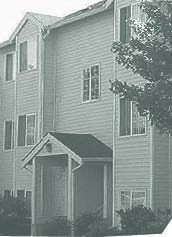R.I.S.E.: The Only Way Is Up
Responsibility. Independence. Support. Empowerment. These are the fundamental principles of the R.I.S.E. program at Community Youth Services (CYS) in Olympia, Washington. And while the “C” in CYS stands for Community, it could just as easily represent the organization’s firm commitment to Collaboration.
CYS manages over a dozen programs in its efforts to support youth and families, including a transitional living program, or TLP, for homeless youth or those living in unsafe living situations, and a Chafee Foster Care Independence Program, or CFCIP, that provides basic life skills and support to youth who are, or have been, in foster care.
Based on a Positive Youth Development model, both of these programs aim to help youth achieve their goals and move toward self sufficiency, and “because they were both housed under one roof, we saw it as a natural collaboration,” says program director Maureen McLemore.
 |
| R.I.S.E. transitional living house |
Both programs operate under the R.I.S.E. umbrella. Working with other CYS programs as well as other community agencies, R.I.S.E. has created an environment where services, such as life skills training, employment and educational assistance, and service learning opportunities are provided to all youth, over 70 each year, in a collaborative environment.
“Our participants don’t even know that they are in two different programs,” McLemore says. “If you asked them, ‘Are you in an independent living or transitional living program?’ They’d look at you and say, ‘What?’”
CYS staff members enjoy the collaboration. Washington State’s independent living program coordinator attends staff meetings “and does case consultation for any youth that we are co-serving,” says McLemore.
And now, thanks to a staffing shift, CYS has an independent living case manager who works full-time with the R.I.S.E. program and leads all the independent living workshops attended by both CFCIP and TLP participants.
R.I.S.E. is a busy program. They usually handle 40 to 50 applications at any given time for the 48 available slots. Staff divide the applicant list into “active” and “inactive”—since youth are supposed to keep in touch while waiting for an opening. But R.I.S.E. program staff start case management before youth even enroll to give them a head start on the program.
“We make referrals, we begin a discussion about what their plans are and what they can do to prepare,” McLemore says. Youth might enroll in GED classes or begin looking for work. During this time, they are also able to attend life skills workshops offered to youth already enrolled in the program.
All of the youth who enter the R.I.S.E. program, “whether they’ve been in foster care or not,” are evaluated using the Ansell-Casey Life Skills Assessment to determine the youth’s independent living skills. Using the results, the youth, with guidance from their case managers, create an individual living plan that outlines their goals and what they must do to reach them.
Once in the program, youth are expected to be working on those goals—whether that means pursuing employment, attending school, or going to parenting classes—or trying to resolve their barriers to success.
Youth who have been in foster care also have an independent living case manger. McLemore views this relationship as invaluable to those young adults. The case manager can be there “as an advocate, as a mentor, as a teacher, as someone to listen when things aren’t going well.” The independent living case manager can also help former foster care youth navigate the paperwork required to apply for education and training vouchers or to access funds to help with rent.
R.I.S.E. collaborates with many other programs under the CYS umbrella, including the runaway shelter, drop-in center, street outreach, and CareerTrek, a program to help low-income youth develop a career plan. Through other collaborations, youth can access a variety of other services onsite, including an alternative school, mental health and drug and alcohol assessments, plus referrals and weekly screenings from the health department.
Cooperation continues outside the walls of CYS too. “We collaborate with many agencies in our area,” McLemore says. “And I think what happens is…you add a whole new dimension to your program.”
Collaborations provide resources above and beyond the abilities of discrete programs, and provide youth “a larger safety net,” she says.Collaboration is considered critical to the wraparound services CYS provides. “It’s just working beautifully,” McLemore says. The TLP/CFCIP collaboration “enriches both programs,” she says. And, undoubtedly, that enrichment extends to many young lives.


 Sign up
Sign up Follow us
Follow us Like us
Like us Sign up for our RSS feeds:
Sign up for our RSS feeds: 

